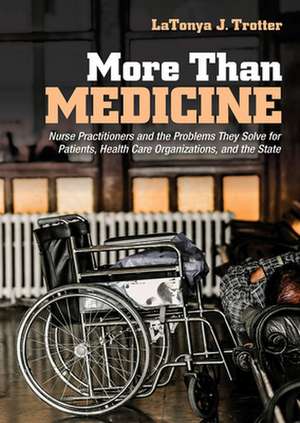More Than Medicine – Nurse Practitioners and the Problems They Solve for Patients, Health Care Organizations, and the State: The Culture and Politics of Health Care Work
Autor Latonya J. Trotteren Limba Engleză Paperback – 14 apr 2020
| Toate formatele și edițiile | Preț | Express |
|---|---|---|
| Paperback (1) | 183.00 lei 6-8 săpt. | |
| MB – Cornell University Press – 14 apr 2020 | 183.00 lei 6-8 săpt. | |
| Hardback (1) | 719.26 lei 6-8 săpt. | +31.15 lei 6-10 zile |
| MB – Cornell University Press – 14 apr 2020 | 719.26 lei 6-8 săpt. | +31.15 lei 6-10 zile |
Din seria The Culture and Politics of Health Care Work
-
 Preț: 133.80 lei
Preț: 133.80 lei -
 Preț: 155.26 lei
Preț: 155.26 lei -
 Preț: 191.79 lei
Preț: 191.79 lei -
 Preț: 145.79 lei
Preț: 145.79 lei -
 Preț: 119.98 lei
Preț: 119.98 lei -
 Preț: 138.55 lei
Preț: 138.55 lei -
 Preț: 144.34 lei
Preț: 144.34 lei -
 Preț: 322.81 lei
Preț: 322.81 lei -
 Preț: 109.67 lei
Preț: 109.67 lei - 5%
 Preț: 117.33 lei
Preț: 117.33 lei -
 Preț: 166.80 lei
Preț: 166.80 lei -
 Preț: 149.48 lei
Preț: 149.48 lei -
 Preț: 117.72 lei
Preț: 117.72 lei -
 Preț: 140.21 lei
Preț: 140.21 lei -
 Preț: 144.34 lei
Preț: 144.34 lei -
 Preț: 107.19 lei
Preț: 107.19 lei -
 Preț: 142.30 lei
Preț: 142.30 lei -
 Preț: 225.50 lei
Preț: 225.50 lei -
 Preț: 121.66 lei
Preț: 121.66 lei -
 Preț: 245.70 lei
Preț: 245.70 lei -
 Preț: 101.82 lei
Preț: 101.82 lei -
 Preț: 129.51 lei
Preț: 129.51 lei -
 Preț: 125.55 lei
Preț: 125.55 lei -
 Preț: 126.41 lei
Preț: 126.41 lei -
 Preț: 182.12 lei
Preț: 182.12 lei -
 Preț: 190.24 lei
Preț: 190.24 lei -
 Preț: 185.18 lei
Preț: 185.18 lei -
 Preț: 168.89 lei
Preț: 168.89 lei -
 Preț: 214.18 lei
Preț: 214.18 lei -
 Preț: 103.70 lei
Preț: 103.70 lei -
 Preț: 227.41 lei
Preț: 227.41 lei -
 Preț: 136.91 lei
Preț: 136.91 lei - 27%
 Preț: 718.70 lei
Preț: 718.70 lei - 27%
 Preț: 719.26 lei
Preț: 719.26 lei -
 Preț: 393.08 lei
Preț: 393.08 lei -
 Preț: 395.38 lei
Preț: 395.38 lei - 27%
 Preț: 717.00 lei
Preț: 717.00 lei -
 Preț: 218.88 lei
Preț: 218.88 lei -
 Preț: 294.82 lei
Preț: 294.82 lei -
 Preț: 290.55 lei
Preț: 290.55 lei
Preț: 183.00 lei
Nou
Puncte Express: 275
Preț estimativ în valută:
35.02€ • 36.18$ • 29.13£
35.02€ • 36.18$ • 29.13£
Carte tipărită la comandă
Livrare economică 19 martie-02 aprilie
Preluare comenzi: 021 569.72.76
Specificații
ISBN-13: 9781501748158
ISBN-10: 1501748157
Pagini: 216
Dimensiuni: 153 x 229 x 16 mm
Greutate: 0.32 kg
Editura: MB – Cornell University Press
Seria The Culture and Politics of Health Care Work
ISBN-10: 1501748157
Pagini: 216
Dimensiuni: 153 x 229 x 16 mm
Greutate: 0.32 kg
Editura: MB – Cornell University Press
Seria The Culture and Politics of Health Care Work
Descriere
Descriere de la o altă ediție sau format:
"Shows how a group of nurse practitioners expand the medical encounter to include a mix of health, social, and coordination problems--illustrating the ways in which these providers are not just filling-in for absent physicians, but are filling in for the absence of the state in attending to the problems of poverty and unequal access to health care"--
"Shows how a group of nurse practitioners expand the medical encounter to include a mix of health, social, and coordination problems--illustrating the ways in which these providers are not just filling-in for absent physicians, but are filling in for the absence of the state in attending to the problems of poverty and unequal access to health care"--
























